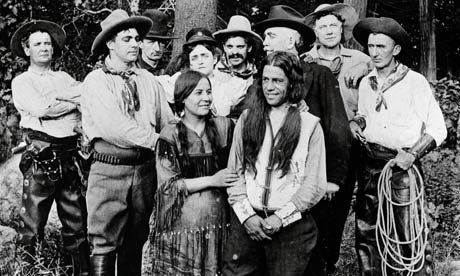
"Cinema was once the most amnesiac of arts. It has now recovered from that malaise – and a man called James Young Deer is the proof. He was an actor, director and producer who managed a prolific Californian studio that specialised in westerns. But his films had an angle that distinguished them from all the rest, and would, under different circumstances, have assured his name a comfortable place among the masters of the genre. Young Deer was celebrated as that unaccountably rare being, a Native American film-maker – a member of the Winnebago tribe. In his movies, the Indians were never the villains. Instead of howling around bonfires and turning stagecoaches into porcupines, they were figures of heroism and moral authority. When a red man sank his blade into a white man in a Young Deer picture, he did it with justice on his side – and audiences applauded. They might still be applauding, had all this not happened before the first world war, when the medium had yet to develop a sense of its own permanent value. But Young Deer's career did not outlast that conflict, for reasons as murky and strange as almost everything else in his life. In 1913, the San Francisco papers buzzed with articles alleging his involvement with a "white slavery ring" in Orange County. The testimony of a 15-year-old girl saddled him with a charge of statutory rape. Young Deer claimed he was the victim of a racist conspiracy – "the vengeance that the white men meted out to Indians". With the tacit approval of the judge, he jumped his $1,500 bail and fled the US to make a new life abroad. With hindsight, his choice of destination seems unusual. When James Young Deer went on the lam, he didn't stop running until he reached East Finchley, a sleepy north London suburb. On a patch of land now occupied by the Newstead Children's Centre adventure playground, he clocked on for British and Colonial Films to make crime melodramas about heroic street urchins and dashing heroes of Empire. For the Papoose and Cowboy Justice gave way to The Black Cross Gang and The Water Rats of London. In California, he had hogtied horses and thrown them from canyons; in London, he let off pyrotechnic charges that shook the pavements, encouraged his actors to hurl themselves into the Thames, and set fire to anything his employers would permit." Get the Story:
The first Native American director. Or was he? (The Guardian 9/24)